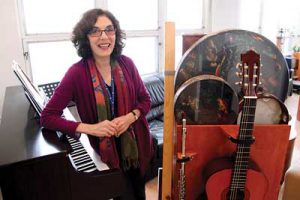Palliative care music therapy helps patients celebrate the past and embrace the present

By Neale McDevitt
As a music therapist for the past 26 years, Deborah Salmon understands better than most the important role music can play in people’s lives. But as the music therapist for the Montreal General Hospital’s palliative care service, she also understands the vital role music can play as people prepare to die.
“Music touches lots of different parts of us. Emotion, cognition, memory – all are affected by music,” said Salmon, herself a classically trained flutist. “And it is part of our life cycle, beginning with lullabies and the way we learn our ABCs.
“We have rhythm in our bodies with our heartbeat and pulse and melody in our voices. And we have harmony in that we aren’t alone, we live in communities, living in consonance or dissonance with each other.”
Music therapy in palliative care has a variety of different functions. It can help humanize the hospital environment and lift the mood of patients and their families. But it can also be a powerful tool that can either stimulate or relax.
Salmon uses music and imagery to help transport patients to a place in their mind that is warm and welcoming. Her ocean drum – a large tambourine-like instrument filled with small ball bearings that simulate the sound of waves by gently tipping it back and forth – is popular for its soothing sounds. “Music helps regulate the heartbeat and decrease a person’s anxiety,” said Salmon. “It can take the focus away from pain and if they are more relaxed it allows medications to do their job better.
“It can also trigger memories,” continued Salmon. “People in palliative care often are reviewing their lives and music can bring them back to different times.”
Pushing a modified nurse’s cart crammed with songbooks and various musical instruments down the hall, Salmon can respond to just about any type of musical request, be it to provide a CD with songs requested by patients or to play and sing for them, or even the more active option of creating music along with a patient. “Sometimes we’ll get whole families singing along.”
Self-expression through music
Christelle Jacquet is also a music therapist who does some palliative care work, only she works at the Montreal Children’s Hospital with patients ranging in age from newborns to young adults.
The younger the patient, the more receptive the music therapy – meaning the therapist does most of the playing. Jacquet, herself a violinist, prefers voice and guitar to stimulate her young wards, including some as young as two weeks.
Depending upon their energy levels, older children and young adults sometimes gravitate to more active therapy in which they participate in making music. “One of the primary goals is self-expression,” said Jacquet. “A lot of these children have trouble verbalizing their feelings and improvising with instruments gives them a chance to express themselves in a non-verbal way.”
While she does work out of the Children’s, Jacquet does most of her work at her patients’ respective homes, where they are more comfortable and at ease. Regardless of the setting, the primary goal is to live in, and embrace, the present. “With palliative care patients, the focus is naturally more on the moment than on long-term developmental goals,” said Jacquet. “I’m there to provide my client and their family with a positive and meaningful experience based on the present needs.”
A rare privilege
Salmon has done substantial psychotherapy training because “music therapy can evoke all kinds of emotions and we need to know how best to work with them.”
As such, she often shares an intimacy with people she sometimes has known for just a few moments, talking to them, listening to stories of days gone by and sometimes helping them create and record “legacy CDs” for spouses, children, even unborn grandchildren.
If patient and family are receptive to the idea, Salmon will even be in the room as a person nears death. Using a technique called “matching,” she will play music that can help regulate irregular breathing and “like a lullaby, help a person feel less afraid.
“It is a wonderful privilege to be let into a person’s life at this moment.”
